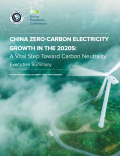This report discusses why green innovation is essential, the enormous economic as well as environmental opportunities that it represents, and how it might be achieved. It highlights key challenges in five priority sectors (resources and waste, construction, water, food, transport of goods) and provides recommendations for policy makers and businesses.

China Zero-Carbon Electricity Growth in the 2020s takes a look at the economic and technical issues involved with China’s coming transition to zero-carbon electricity.
To electrify ridehailing vehicles at scale, key industry stakeholders must collaborate. Analyzing 100 million miles of actual electric and gasoline ridehailing vehicle data, this report offers actionable recommendations for stakeholders to address three key barriers to implementation. Rocky Mountain Institute collaborated with General Motors to better understand the challenges and opportunities of transportation network company (TNC) electrification by evaluating a year of actual operational data—of both EVs and internal combustion engine (ICE) vehicles operating in TNC services.
This publication was initiated by the Energy and Climate Change Leadership Group of the International Council of Chemical Associations (ICCA) to demonstrate how the chemical industry can contribute to achieving this low-carbon society.
This report proposes a framework for prioritizing US and Canadian regions for electric truck deployments based on differences in key enabling traits. The highest priority regions share traits such as relatively mild weather, cheap electricity prices, high levels of freight movement, a pressing need to improve air quality, and supportive policies and incentives.
